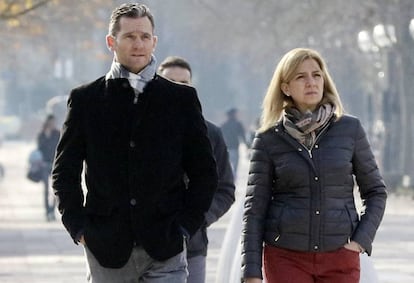Spanish king’s sister gets preferential treatment on visits to her jailed husband
Prison authorities say their attitude towards Cristina de Borbón is justified due to security reasons


Cristina de Borbón, sister to Spain’s King Felipe VI, is getting preferential treatment from prison authorities on her visits to her husband Iñaki Urdangarin, who is serving a five-year, 10-month sentence at Brieva penitentiary, in Ávila province. And it’s going to stay that way.
In a recent reply to Unidos-Podemos senator Joan Comorera, the Interior Ministry said that “security circumstances” justify the fact that Princess Cristina is allowed to take her private car right to the door of the facility, and that she is not made to wait with other visitors who have come to see their jailed relatives.
So far, Cristina de Borbón is known to have paid two visits to her husband
In its reply, the government said that such deference aims “to avoid offensive demonstrations from, or possible altercations with, other [visitors].” The statement underscores that authorities have an obligation to guarantee “the safety and privacy of inmates and visitors during the visits.”
So far, Cristina de Borbón is known to have paid two visits to her husband, who is doing time for embezzlement, influence peddling and tax crimes in a case named after the Nóos Institute, a not-for-profit foundation that he and a business partner used to secure no-bid contracts from the regional governments of Valencia and the Balearic Islands using Urdangarin’s influence.
Her first visit was in late June, soon after the king’s brother-in-law reported to Brieva, a women’s prison that has a small, previously empty module for male prisoners. The second visit was on July 8. After that, no media records exist of further visits, although other relatives and friends of Urdangarin’s have been seen at the center.
There have been congressional and senatorial questions regarding Urdangarin’s prison regime ever since he was admitted into Brieva as its sole male prisoner
There have been congressional and senatorial questions regarding Urdangarin’s prison regime ever since he was admitted into Brieva as its sole male prisoner, at his own request. Years before him, there was another high-profile prisoner who did time at Brieva in similar circumstances: Luis Roldán, former director general of Spain’s Civil Guard, who fled the country in 1994 to escape corruption and fraud charges, but who turned himself the following year in Bangkok.
The Interior Ministry’s reply did not specifically mention Cristina de Borbón or Iñaki Urdangarin, instead saying that “the inmate alluded to, just like any other individual serving a sentence at the Ávila Penitentiary Center, enjoys the same ordinary and family communications as any other inmate, and in the same conditions as established by penitentiary regulations.”
Urdangarin, a former Olympic handball champion, married Cristina de Borbón in 1997. The Nóos case was an offshoot of a wider inquiry into a major graft case in Palma de Mallorca that brought down regional Balearics premier Jaume Matas.
English version by Susana Urra.
Tu suscripción se está usando en otro dispositivo
¿Quieres añadir otro usuario a tu suscripción?
Si continúas leyendo en este dispositivo, no se podrá leer en el otro.
FlechaTu suscripción se está usando en otro dispositivo y solo puedes acceder a EL PAÍS desde un dispositivo a la vez.
Si quieres compartir tu cuenta, cambia tu suscripción a la modalidad Premium, así podrás añadir otro usuario. Cada uno accederá con su propia cuenta de email, lo que os permitirá personalizar vuestra experiencia en EL PAÍS.
¿Tienes una suscripción de empresa? Accede aquí para contratar más cuentas.
En el caso de no saber quién está usando tu cuenta, te recomendamos cambiar tu contraseña aquí.
Si decides continuar compartiendo tu cuenta, este mensaje se mostrará en tu dispositivo y en el de la otra persona que está usando tu cuenta de forma indefinida, afectando a tu experiencia de lectura. Puedes consultar aquí los términos y condiciones de la suscripción digital.








































